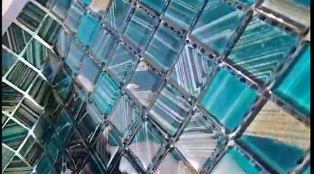When it comes to choosing tiles for swimming pools, glass mosaic tiles and ceramic tiles each offer unique advantages and disadvantages. Here’s a comparison of the two.
1. Aesthetic Appeal
– Glass Mosaic Tiles: Known for their vibrant colors and light-reflective qualities, glass tiles create a stunning visual effect, enhancing the beauty of the pool.
– Ceramic Tiles: While available in various colors and designs, ceramic tiles generally lack the same level of luminosity and depth that glass tiles provide.
2. Moisture Resistance
– Glass Mosaic Tiles: Highly resistant to moisture, making them ideal for pool environments without fear of water damage.
– Ceramic Tiles: Also water-resistant, but their porous nature can lead to absorption over time if not properly glazed.
3. Maintenance
– Glass Mosaic Tiles: Easy to clean and maintain due to their non-porous surface. They resist staining and can be cleaned with standard household cleaners.
– Ceramic Tiles: While generally easy to clean, they may require more effort to maintain their appearance, especially if the surface is not glazed properly.
4. Durability and Strength
– Glass Mosaic Tiles: Typically more durable and resistant to chips and scratches, making them a long-lasting option.
– Ceramic Tiles: Durable as well, but can be prone to chipping if heavy objects fall on them.
5. Cost
– Glass Mosaic Tiles: Usually more expensive due to their aesthetic appeal and manufacturing process.
– Ceramic Tiles: Generally more budget-friendly, making them a popular choice for larger projects.
6. Design Versatility
– Glass Mosaic Tiles: Offer extensive design possibilities with various shapes, sizes, and colors, allowing for creative installations.
– Ceramic Tiles: Also available in various styles, but the range may be more limited compared to glass.
7. Eco-Friendliness
– Glass Mosaic Tiles: Many are made from recycled materials, contributing to environmental sustainability.
– Ceramic Tiles: While some ceramic tiles are eco-friendly, it depends on the manufacturing process and materials used.
8. Temperature Resistance
– Glass Mosaic Tiles: Generally resistant to temperature changes, which is crucial for outdoor pools exposed to varying climates.
– Ceramic Tiles: Also perform well under temperature fluctuations, but some may crack in extreme conditions if not properly installed.
Conclusion
Choosing between glass mosaic tiles and ceramic tiles for swimming pools depends on your priorities. If aesthetics, durability, and low maintenance are your primary concerns, glass mosaic tiles are a great choice. However, if budget and ease of installation are more important, ceramic tiles may be the better option. Both types of tiles can enhance the beauty and functionality of your swimming pool, making them worthy contenders in any pool design project.


